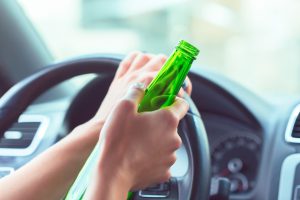 We’ve all heard people say, “I drive better when I’ve had a few drinks. I’m more aware of my surroundings.” Perhaps you’ve even made this statement yourself once or twice. These statements can never actually be true. By default, alcohol is a depressant, which is designed to slow reaction times and inhibit the brain from being as aware as it would normally be if it weren’t under the influence.
We’ve all heard people say, “I drive better when I’ve had a few drinks. I’m more aware of my surroundings.” Perhaps you’ve even made this statement yourself once or twice. These statements can never actually be true. By default, alcohol is a depressant, which is designed to slow reaction times and inhibit the brain from being as aware as it would normally be if it weren’t under the influence.
There’s a reason the maximum legal blood alcohol concentration (BAC) is only 0.08. In reality, 0.08 doesn’t go very far, and depending on certain factors such as your gender, height, weight, and the amount of food you’ve eaten prior to drinking, your body may not have far to go before you’re considered intoxicated.
On average, the body can metabolize about one standard drink per hour (again, there are several factors that can alter this average higher or lower, depending on a person’s unique circumstances). According to the National Institute on Alcohol Abuse and Alcoholism (NIAAA), a standard drink is any drink that contains about 14 grams of pure alcohol (about 0.6 fluid ounces or 1.2 tablespoons). Typically, a person can consume one of the following within an hour and still be under the legal limit:
- One 12 oz beer
- One 6 oz glass of wine
- One-third to one cocktail (depending on the types of spirits included in the recipe)
- One full shot (or less, depending on the proof or percentage of alcohol)
Even if you’re considered legally within the limits of the law to operate a vehicle, alcohol can start to take its effects on your body after just one drink. The National Highway Traffic Safety Administration (NHTSA) reports negative effects with as little as 0.02 percent alcohol, including drivers’ inability to track moving targets visually and divided attention spans.
Here’s a look at a few other ways intoxication affects your driving ability:
1. Slow Reaction Time
Alcohol inherently slows down your ability to process information and react accordingly.
What happens if someone suddenly stands on their brakes when you’re driving down the interstate? If you can’t react rapidly, you’ll plow right into the back of their car. You’ll be the at-fault driver, and when the police are called, you may be arrested for a DUI, even if you only had a little bit to drink.
What happens if a bicyclist suddenly darts in your path? If you’re not able to brake right away, you could be the cause of personal injury or death because your reaction time is slower than it should be.
2. Lack of Coordination
The simplest of things—like using turn signals correctly—can become a lot more difficult when you’re under the influence. The more impaired your coordination, the more likely you are to be involved in an incident that could ultimately put you in the back of a police car.
Examples might include:
- Making wide turns, taking up part of the adjacent lane before turning the corner
- Reversing instead of going forward, or vice versa
- Accelerating instead of braking
- Inability to figure out how to turn headlights on when there’s reduced daylight
- Stopping over the line at an intersection
3. Reduced Concentration
With only a little bit of alcohol in your system, you may find yourself more interested in things you wouldn’t otherwise be distracted by while you’re driving.
If your phone alerts you of a text message, you might be more inclined to reach for your phone, when you’d otherwise ignore it until you got home. You may find yourself fiddling with the radio more frequently or searching for your favorite tunes on your music app.
In the long run, there are tons of distractions on the road, whether you’re sober or intoxicated. When you’ve had a bit to drink, your concentration levels are going to be depleted, leaving you even more susceptible to on-the-road incidents.
4. Decreased Vision
Blurry vision is a sure sign that you shouldn’t put your keys in the ignition, but there are subtler signs you may not notice unless you’re specifically looking for them.
For example, after a few drinks, it becomes harder to control your eye movement. If you’ve convinced yourself that you’re fine to drive, you may not realize your eyes have grown a mind of their own, but the result can cause you to miss objects in your peripheral vision or misjudge the distance between objects—either of which can result in devastating outcomes.
5. Inhibited Judgment
Your role as a driver is governed by judgment. Drivers are constantly bombarded with information and obstacles, and potential catastrophes every time you drive. If you’re intoxicated, you may not properly judge the speed at which an oncoming vehicle is traveling before you attempt to cross lanes of traffic. In other situations, you may not be able to anticipate other drivers’ poor decisions as well as you might if you were sober.
You must be able to anticipate potential problems on the road and react accordingly, in order to make proper judgment calls.
Being arrested for a DUI is no laughing matter. No matter how much—or how little—you drank before you were pulled over, you’re facing a serious situation if an officer has charged you for driving under the influence. Your next course of action should be contacting a DUI attorney right away.
Artz & Sturm are Los Angeles-area DUI attorneys who help clients achieve optimal results from their DUI cases. Call us—24 hours a day, 7 days a week—at (310) 820-1315.


